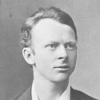Charles Fillmore

Charles Fillmore
Charles Sherlock Fillmorefounded Unity, a church within the New Thought movement, with his wife, Myrtle Page Fillmore, in 1889. He became known as an American mystic for his contributions to spiritualist interpretations of biblical Scripture...
NationalityAmerican
ProfessionEducator
Date of Birth22 August 1854
CountryUnited States of America
Charles Fillmore quotes about
law people giving
It is necessary to give freely if we are to receive freely. The law of receiving includes giving. The knowledge that substance is omnipresent and that people cannot, therefore, impoverish themselves by giving (but rather will increase their supply) will enable us to give freely and cheerfully.
letting-go giving-up rooms
We must learn to let go, to give up, to make room for the things we have prayed for and desired.
ideas spirit forthcoming
When we commune with the spirit within and ask for new ideas, they are always forthcoming.
children simplicity mind
It is the childlike mind that finds the kingdom.
positivity reality mind
Divine mind is the one and only reality.
poverty sin poor
It is a sin to be poor.
praise increase
We increase whatever we praise.
art character imagination
The highest and best work of imagination is the marvelous transformation that it works in character. Imagine that you are one with the principal of good, and you will become truly good.
success opportunity
There are opportunities everywhere, just as there have always been...
technology men ideas
Men who accomplish great things in the industrial world are the ones who have faith in the money producing power of ideas.
time men space
Imagination gives the man the ability to poject himself through time and space and rise above all limitations.
meditation source turns
Be still and turn within to the great source.
reality demand spirit
The Inexhaustible Resource of Spirit is equal to every demand. There is no reality in lack. Abundance is here and now manifest.
character men thinking
The one and only formative power given to man is thought. By his thinking he not only makes character, but body and affairs, for "as he thinketh within himself, so is he."